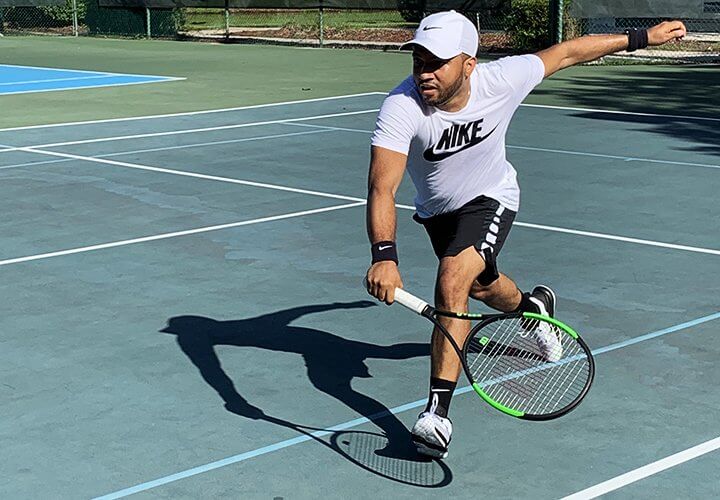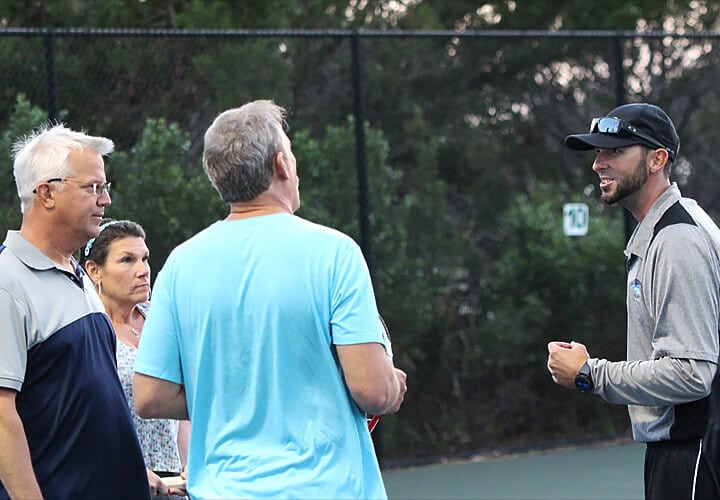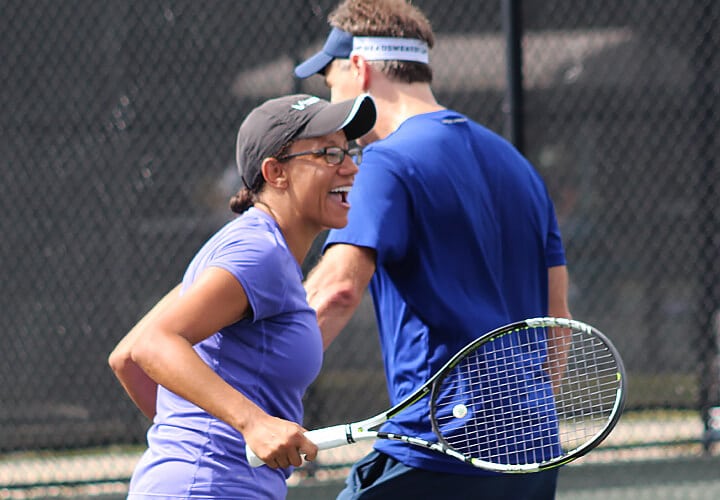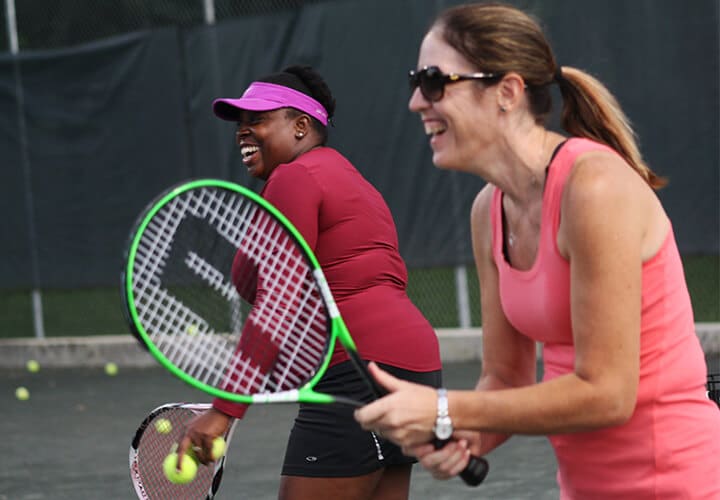Love to Learn, Love to Play, & Love to Roll programs offer providers a unique curriculum that includes professional coaching and volunteer mentoring to help players get started and grow in the game.
Play Opportunities

How To Participate in Love To Play, Learn and Roll Programs
We have the tools to and resources to help you gain a positive and fun experience when participating in a Love to Learn, Love to Play, or Love to Roll programs. Download a copy of the Player’s Guide and learn how you can get involved in the fastest growing sport!
The Programs
Both programs are short programs that combine professional & mentor coaching to create fun no-judgment experiences for beginner and intermediate players. Players learn the basics and get on-court fun match play experiences preparing them for on-court tennis fun for years to come. Check out the comparisons below.
Love To Learn
- Player Level: Beginner (just starting or returning)
- Ball Type: Red, Orange, or Green
- Session Formats: Fun drills, games, & friendly competion
- Program Length: 6-8 weeks
- Session Length: 60 minutes (recommended additional 30-90 minutes after week 3)
- Coaching: Professional during weeks 1-6, volunteer ambassador play sessions starting at week 4
- Recommended Next Steps: ‘Love to Play’, clinics, or lessons
Love To Play
- Player Level: Intermediate (completed a ‘Love to Learn’ or similar instruction)
- Ball Type: Orange or Green
- Session Formats: Fun mentored match play
- Program Length: 4-6 weeks
- Session Length: 60-90 minutes
- Instruction: Mentored fun, and interdependent match play
- Recommended Next Steps: Clinics, casual play, or formal tennis program play
Coach or Host

How To Run Love To Learn, Play, and Roll Programs
We have the tools to and resources to help you get your Love to Learn, Love to Play, and Love to Roll programs up & running and create the best experience for your participants. Download a copy of the Provider’s Guide and click the tabs below for guidance with scheduling, promotion, and more.
Click on the Tabs Below for More Information
Schedule Recommendations
It’s important to create a schedule that is convenient and consistent for your participants. Below are some recommendations for setting up a schedule that is attractive to participants and helps create the best experience for all.
- Ask members and other club players for their input regarding the best time(s).
- You will need 1 – 3 courts
- Plan for 1 hour at the same day and time
Registration Recommendations
It’s critical to creating an easy and convenient way for interested participants to sign up, and for you to get the information you need. Below are registration recommendations.
- Provide online registration. Online registration allows you to capture the information you need and a link you can share in many places. We do not recommend using paper sign ups or “call/email to register” as they are often inconvenient, problematic, and difficult to manage. There are a variety of online registration options. Click the links below for more information.
- USTA Serve Tennis platform
- Eventbrite
- Online form systems such as Jotform, Google Forms, or Microsoft Forms
- Your Club/Facility online registration system
- Determine what information you want to capture. We recommend making it simple and limiting what information you are asking for upfront. Additional information can be captured later on after sign up if need be (i.e. waivers, emergency contact info, etc.). Some basic information to capture at sign up can be:
- Name
- Phone
- Address
- Determine how the payment will be taken. Online payment at sign up is typically the easiest and most convenient method for both you and the participant. If online payment is not an option notify the participant that payment will be taken on site.
Promotion Recommendations
Now that you have the dates/times and a way to sign up, it’s time to get the word out and sign participants up. We have you covered with step-by-step guidance to marketing your program.
- Add your event to the USTAFlorida.com calendar and your club/facility online calendar.
- Add the event to your club/facility Facebook page Events & add USTA Florida as a co-host.
- Add your event to your club/facility Google Business listing
- Create and distribute flyers.
What takes place during Weeks 1-6
For weeks 1, 2, & 3 participants will take part in a fun 1-hour sessions learning and practicing the basics of tennis. This includes:
- Warming up
- Equipment
- Court layout
- Footwork
- Serving
- Basic strokes
During weeks 4, 5, & 6 the sessions increase by 30 minutes. With the Love to Learn Ambassador players will:
- Practice rallying on a short court
- Practice scoring with an Orange Ball on a 60′ court
- Practice doubles positioning on a full court
- And getting registered for the upcoming Love to Play sessions!
Follow Up
When the 6 weeks conclude the Ambassador plays a key role in keeping touch with players & helping them get registered for Love to Play. Ambassadors also assist in preparing for the upcoming Love to Play sessions.

The Ambassador Role
Volunteer mentors help provide a less intimidating and more personalized experience for participants. Ambassadors should have tennis play experience and help serve to connect beginner clinics to match play.
Click on the Tabs Below for More Information
The Purpose of Ambassadors
We have found that Ambassadors are key to the success of beginner clinics and those starting match play. New players often feel intimated bringing their newly learned skills onto the tennis court. With your encouragement and tennis knowledge, new players will gain the confidence to branch out into new opportunities and start their tennis life.
Ambassadors should have the following qualities:
- Experienced tennis player
- Strong knowledge of the game and a fun attitude
Ambassador Role in a Love To Learn Program
The Ambassador role begins with weeks 4-6 in the Love To Learn Program. We recommend that Ambassadors reach out to participants in week 3 to introduce themselves and explain next steps. From theere your role will be the following:
- Serve as a point of contact for scheduling and any updates.
- Facilitate practice play and skill usage that was learned in clinics.
- Encourage cooperative rallying and introduce concepts of sportsmanship and traditions.
- Assist with identifying a good time for players to continue to enhance their skill in the game with a Love to Play program.
Ambassador Role After Love to Learn
After the Love to Learn sessions end, Ambassadors continue to play a vital role in assisting participants to continue to play. A few of the ways Ambassadors assist during this time are:
- Helping the Tennis Pro with the scheduling of a Love to Play session.
- Assisting with communicating, following up with participants, and questions with registering for Love to Play.
- Planning for the kick-off of the Love to Play program.
Ambassador Role in a Love To Play Program
The Ambassador’s role in facilitating practice play is critical to the success of the player. Players will be 6 weeks into their tennis career and will need assistance bringing their newly learned skills into a match situation. The curriculum on the next few pages is an example of how to progress a player to a level where they are comfortable playing independently.
REMEMBER you are not a Teaching Professional! The objective of these play sessions is to develop the overall player, and not focus on technique. Feel free to adjust the game plan to best fit the players you are mentoring.
The Ambassador’s role is to:
- Engage with adult players to assist so they experience tennis play is a friendly and welcoming environment.
- Facilitate match play to allow players to learn the rules and the traditions of the game in a judgement free zone.
- Mentor by serving as a resource for beginning players to answer questions and help them find appropriate play opportunities.
- Organize and communicate weekly play sessions encouraging fun, social play with other players at the same skill level.
Ambassador Role After Love To Play
After the Love to Play sessions end, Ambassadors can continue to play a vital role in assisting participants to continue to play. It’s vital to make players aware of the variety of play opportunities available such as casual play such as round robins, cardio tennis, USTA League play, etc. and how they can sign up. Ambassadors can serve as a point of contact for questions, guidance, or someone to get together and play with.
Now that the beginner players are engaged, it is important to have more opportunities to improve their tennis career. Get in touch with your Local Play Coordinator or Jen Wysocki to go over “Next Play Opportunities” like Quads or other beginner social play leagues.
Additional Resources
National Resources
Have Questions or Need Assistance?
We are here to help. Contact us and let us know how we can help you.


